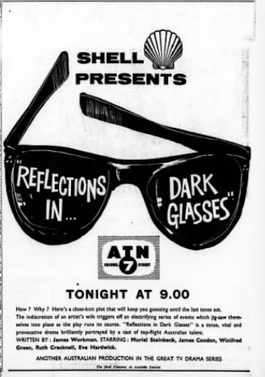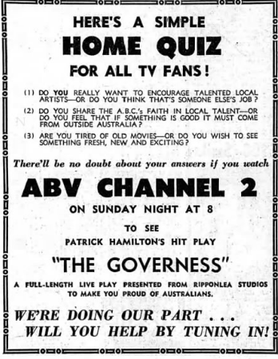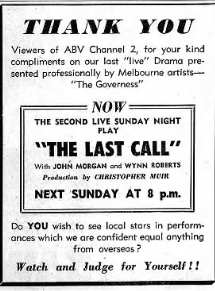
Shell Presents was an early attempt at Australian television drama, being an umbrella title for several different productions. It debuted on 4 April 1959, and aired on ATN-7 and GTV-9, who split production of plays for the series between them. It was an anthology series, each program being a self-contained play for television. The series won a Logie award in 1960 for TV Highlight of 1959. As the title suggests, it was sponsored by Shell. It was described as "a very big deal for the station: major institutional sponsorship from international companies for locally produced drama." It would be followed by The General Motors Hour.

Tomorrow's Child is an Australian television film, or rather a live one-off television play, which aired in 1957 on ABC. Directed by Raymond Menmuir, it is notable as an early example of Australian television comedy and was Australia's first live hour long drama. It was set in the future making it technically Australia's first science fiction drama.

Blue Murder is an Australian live television play which aired in 1959 on ABC. Broadcast live in Sydney on 2 December 1959, a kinescope ("telerecording") was made of the broadcast so it could be shown in Melbourne.

"Reflections in Dark Glasses" is an Australian television film, or rather a television play, which aired in 1960. It aired as part of Shell Presents, which consisted of monthly presentations of stand-alone television dramas. It was written by Sydney writer James Workman, and is notable as an early example of Australian-written television drama. It was broadcast live in Sydney on 6 February 1960, then recorded and shown in Melbourne.
Treason is a 1959 Australian television live drama, which aired on ABC about the 20 July plot during World War Two. Originally broadcast 16 December 1959 in Melbourne, a kinescope ("telerecording") was made of the program and shown in Sydney on 13 January 1960. It was an adaptation of a stage play by Welsh writer Saunders Lewis, which had previously been adapted as an episode of BBC Sunday-Night Theatre.
"The Scent of Fear" is television play written by Ted Willis. It was originally written for British anthology series Armchair Theatre, adapted from the story "Stowaway" by Mary Higgins Clark which was reportedly based on a real story that happened in 1949. It was filmed for Australian TV in 1960.

Rope is a 1957 Australian television film based on the play Rope by Patrick Hamilton. It was presented in real time.
Citizen of Westminster is an early example of Australian television drama which aired on ABC. A one-off play set in England, it aired live on 8 October 1958 in Sydney, and kinescoped for showing in Melbourne on 30 November 1958. Australian TV drama was relatively rare at the time.

The Strong Are Lonely is a 1959 Australian television play produced by Ray Menmuir and starring John Alden. It was one of several plays set in South America.
An Enemy of the People is a 1958 Australian television play starring James Condon. It was based on the 1882 play by Henrik Ibsen and was updated to a contemporary Australian setting. It was broadcast live.
Dinner with the Family is a 1959 Australian TV play. Australian TV drama was relatively rare at the time. It featured English star Jessie Matthews in her first Australian TV appearance - she was touring the country at the time - and was shot in Melbourne.
Small Victory is a 1958 television play broadcast by the Australian Broadcasting Corporation. It was set during the Korean War. It was directed by William Sterling and was shot in Melbourne where it aired 26 March 1958.
Gaslight is a 1958 television play broadcast by the Australian Broadcasting Corporation based on the 1938 play Gas Light by Patrick Hamilton. It starred Beverley Dunn.

The Governess is a 1958 television play broadcast by the Australian Broadcasting Corporation based on a play by Patrick Hamilton, which had been performed several times on Australian radio. It was directed by William Sterling who had previously directed an adaptation of Hamilton's Gaslight (1958).
Heart Attack is a 1960 Australian television play written by George F. Kerr. It was recorded in Melbourne, broadcast "live" there, recorded and shown later on Sydney television. It was received with notably critical hostility. It was one of several thrillers filmed in early Australian television.
William Sterling was an Australian producer and director. He was born in Sydney.

The Lark is a 1958 Australian TV version of the 1952 Jean Anouilh play of the same title.

You Can't Win 'Em All is a 1962 Australian television play directed by Patrick Barton. Filmed in London, it was based on a play by Alun Owen which had been previously filmed by the BBC in 1962.

The Devil Makes Sunday is a 1962 Australian television play by New Zealand-born author Bruce Stewart. It was broadcast live from Melbourne, and taped and shown in other cities at a later date.
The Multi-Coloured Umbrella is a 1958 Australian television play based on the stage play of the same name by Barbara Vernon.










